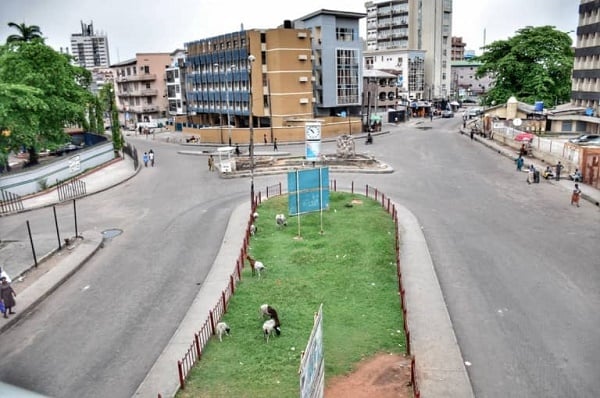BY BOLAJI ALONGE
In Nigeria, just about three months ago, the coronavirus sounded like some faraway disease ravaging China and it was easily dismissed by many. By January 23, the first lockdown was imposed by the central government of China on Wuhan, the epicentre of the then called “2019 novel coronavirus” – little did the world know ”LOCKDOWN” was to become a word that would dominate its consciousness for some time to come.
By mid-February, reports were published on the now rebranded COVID-19 virus by the World Health Organisation (WHO) on outbreaks all around Europe, with Italy faced first with a rising number of casualties, followed by Spain. The world still looked like it would pull through this and it would blow over, many still had no idea what was coming.
Some even thought the coronavirus was not an African thing. ”E no dey affect black people”, a citizen in Lagos once told me. At this point, observers were alarmed as a pandemic had already been declared, followed by a tsunami of cancellations of upcoming events, evacuations and a total disruption of life. Announcements of strict lockdowns in different parts of Europe started, triggering widespread panic around the globe.
Almost a month after the first case of COVID-19 recorded in Nigeria (an Italian who travelled to the country) in late February, the closure of airports was announced to stop the virus from spreading. The initial 14-day lockdown in three parts of the country began and was subsequently extended for another 14 days, with many who earn a daily wage experiencing hardship as they cannot leave their homes.
On the flip side of the strange phenomenon, nature experts have noticed cleaner and clearer air and improvements in marine wildlife. As human beings are being restricted and confined at home on an unprecedented scale, this has already led to a drastic reduction of pollution, and the environment is flourishing.
With aeroplanes not scattered all over our skies, oil price dropping to the lowest in history, industries shut down, shipping activities decimated, more than 90% fewer cars on the roads, the world is at its most quiet since the industrial revolution. Life, as it was known, in big cities especially, has come to a halt.

Moses Agim, a meteorologist said, “The changes in our environment during this COVID-19 lockdown are mainly due to the absence or reduction of anthropogenic activities, heavy-duty industries are operating below capacity or in most cases not operational at all.” Agim continues, ”The implications are that we are currently having low-level pollutants in the atmosphere, carbon emissions have also reduced, whether these gains will have lasting impacts remains be seen, but it is encouraging”.
The Lagos lagoon, often viewed as polluted in some parts, reflects what happens with nature when humans go on a break. One can hope the environment that has been abused and battered by humanity for centuries will heave a sigh of relief at this point.
Viewing the Five Cowries Creek in Lagos these days is like looking into an aquarium where you see all the creatures clearly – different types of fish, crabs, jellyfish as well as species of birds of prey all seemingly enjoying life without our constant encroachment.
The fishermen around the lagoon are making big catches as they have the lagoon almost to themselves since the lockdown. The constant traffic of motorboats, transversing the lagoon is on hold, people littering the lagoon with plastic and all sorts of trash are all at ”home.”
During one of my observations of the clear lagoon, this bird landed right in my line of vision and I was able to record its style of hunting for food at the bottom of the water, sliding from one place to another. It was diving with such grace, making this an outstanding sighting. I had no idea what species it was, but I knew almost immediately who to ask. Bob Daglish is a master photographer, he has a collection of amazing pictures of birds endemic to this part of the world like I have ever seen.
“Cormorant“, the answer came back in the post I made on social media asking for the name. Viewing this bird in its intrepid search for food is fascinating and mirrors how we feel these days, we run out to go look for food, sometimes frantically and run back home for days and days.
The water is so clear, some people are swimming in it already.
Nigeria is currently on its third week of lockdown, coronavirus tests are being carried out and there’s a slight increase in the number of confirmed cases, now at over 700 according to the Nigeria Centre for Disease Control NCDC.
Did we not see it coming? Are we ill-prepared? Will our excellent handling of the Ebola virus in 2014 come in handy? Only time, I am sure, will tell.
When all this will be over, it is important that we pay more attention to the environment and clean up our acts, we have to be responsible now that we see the positive effect of less pollution. In Lagos, taking better care of the environment could also create a lot of jobs including through renewable energy generation.
Meanwhile, this pandemic is a crisis that has shown humanity that slowing down on its damaging activities helps nature. Let’s admire how nature is restoring itself, stay at home and maintain physical distancing and hope this nightmare blows over, rather sooner than later.
Copyright 2025 TheCable. All rights reserved. This material, and other digital content on this website, may not be reproduced, published, broadcast, rewritten or redistributed in whole or in part without prior express written permission from TheCable.
Follow us on twitter @Thecablestyle

